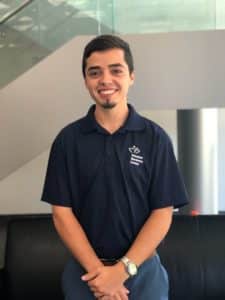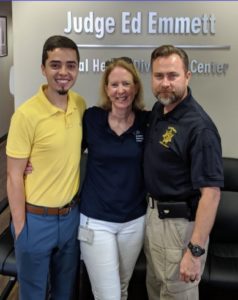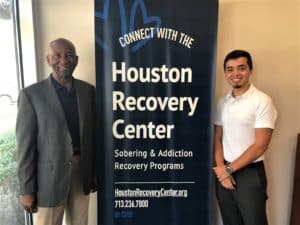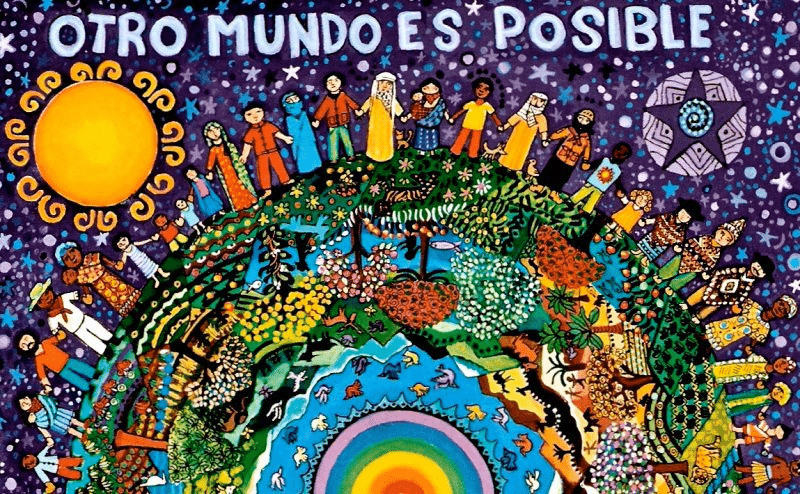
Chris Garcia-Wilde, 2nd year medical student at University of Florida.
“The current circumstances of our society are not permanent. We can and will change them. People at the sobering center are proof of that,” says Chris Garcia-Wilde, a 2nd year medical student at University of Florida.
Garcia-Wilde, a MD/MPH candidate, conducted his field research project with Houston Recovery Center this summer. His goal was to find a place that would put him in uncomfortable community situations so he could grow and to partner with people willing to teach him new skills.
“I connected with Houston Recovery Center because I am passionate about reducing the reliability on jails and prisons to address public health issues, because they don’t work,” says Garcia-Wilde.
He shares this is a personal topic for him since he had two family members briefly incarcerated and two friends currently in jail, which has made him critical of prisons and jails.
“As a future public health physician, I want to be able to shift the reliance on prisons and jails,” states Garcia-Wilde. “We need to build an institution that addresses the problems and is more humanizing. And I saw that in the sobering center.”
Learnings from the Experience
Garcia-Wilde said the environment of the sobering center was much warmer in person than he imagined from reading the article in American Journal of Public Health. “I didn’t realize how caring and welcoming the staff are there,” he said.

Sgt Lomelo, Harris County Sheriff’s Office, with Chris Garcia-Wilde and Suzanne Jarvis at Judge Ed Emmett Mental Health Diversion Center.
Garcia-Wilde learned much more than he expected by experiencing programs first-hand such as Street Outreach, Homeless Outreach Team with Houston Police Department, Reintegration for Change court docket, UTHealth’s HEROES program for opioid overdose intervention, Judge Ed Emmett Mental Health Diversion Center and many more.
One of the surprising aspects he observed in the community revolved around a conversation with two men living on the streets in Tent City. Both were veterans, homeless, one was HIV+ and had a conviction of a sex crime. Garcia-Wilde said they were struggling to get into resources.
“It’s frustrating and discouraging in society that instead of holding people accountable for harm, we are essentially assisting people to become homeless through the criminal justice system and lack of public health,” he states.
Making a Difference
What does Garcia-Wilde hope to do with these experiences and key learnings? First, he wants to change how his classmates and medical school think about substance use, which typically is that it’s an individual decision. Garcia-Wilde said people are criminalized versus seen as an actual health condition that affects the brain and body.
“They haven’t trained us in medical school on how to talk to patients about this,” Garcia-Wilde says. “Substance use disorders can be passed down in families. This is an opportunity to intervene but it doesn’t happen because society addresses it as an individual’s problem.”

Executive Director Leonard Kincaid welcomes Chris Garcia-Wilde to Houston Recovery Center.
He also wants to bring change to Miami by looking at how many public intoxicated folks are booked annually and the viability of a diversion program like the one in Houston.
“I know it’s common in Miami, and this model in Houston can be replicated,” Garcia-Wilde remarks. “I want to show how jails in Miami sap wealth and how a sobering center would help that.”
Most of all, Garcia-Wilde is thankful for the opportunity to be a part of the environment at Houston Recovery Center. “I will encourage my classmates to come here next summer,” he says. “More medical students need to learn about this.”
Biggest Takeaway
 Garcia-Wilde said his biggest takeaway from his experience at Houston Recovery Center is summed up by the quote, “otro mundo es possible.” In translation, he says, it means another world is possible.
Garcia-Wilde said his biggest takeaway from his experience at Houston Recovery Center is summed up by the quote, “otro mundo es possible.” In translation, he says, it means another world is possible.